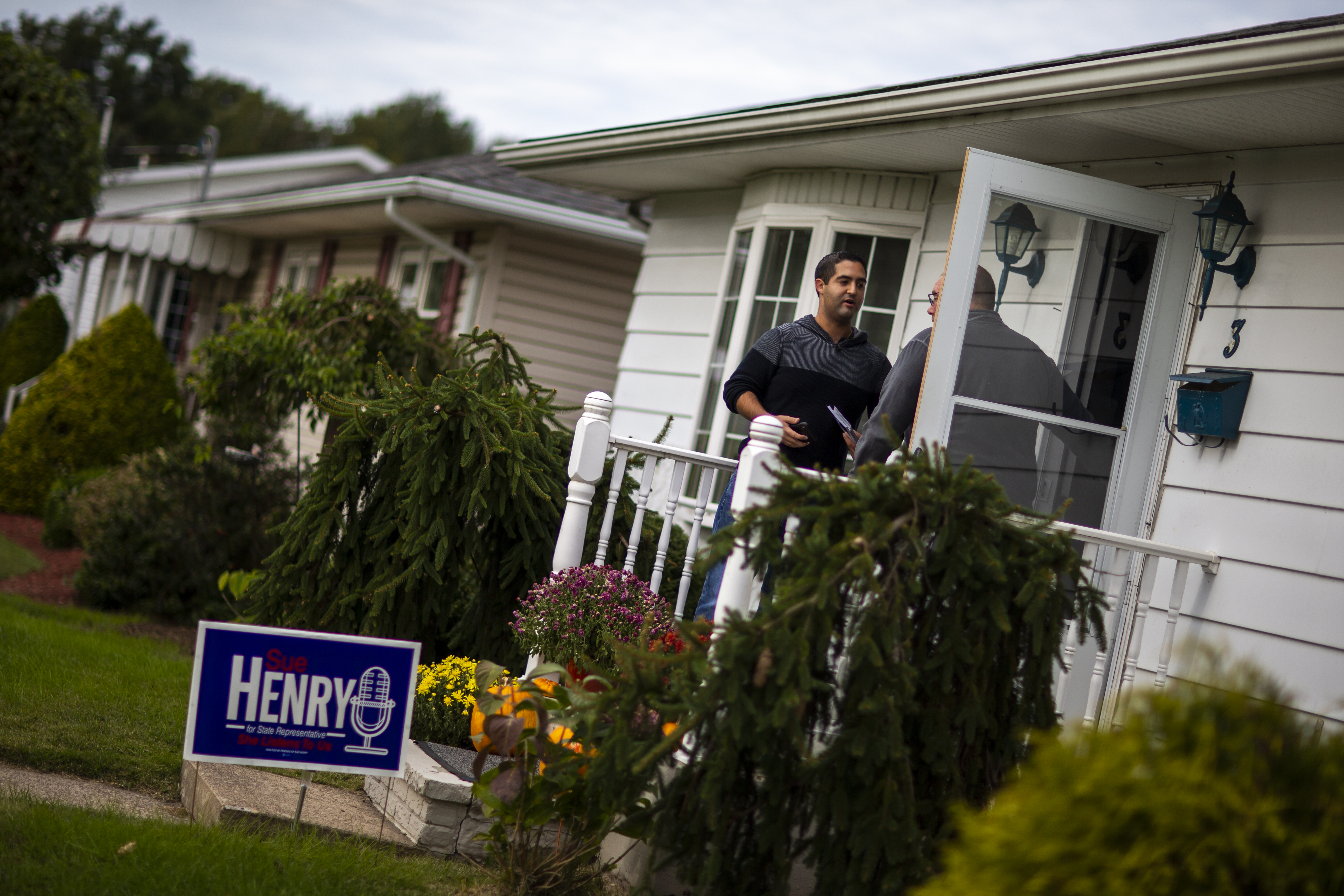Knock, knock with an app: the US door-to-door campaign ritual
John Lombardo, a young campaigner for Republicans, goes door to door near Wilkes-Barre, Pennsylvania, ahead of the November 6 midterm vote (EDUARDO MUNOZ ALVAREZ)
Wilkes Barre (United States) (AFP) – Republican volunteer John Lombardo sets himself an ambitious target when going door-to-door on the campaign trail in battleground state Pennsylvania: a hundred door knocks every two hours.
In the age of the smart phone and algorithms, door knocking has only cemented itself as a vital way to mobilize US voters, especially those traditionally apathetic when it comes to midterm elections.
Lombardo, 25-year-old fire fighter and medic who volunteers for the Republican Party when not working three jobs, walks briskly from house to house in a middle-class suburb on the edges of Wilkes-Barre.
Yet even on a sunny day, visiting neat and tidy homes spruced up for Halloween with pumpkins and witches, is a thankless task. Only one in 10 actually answer the door.
“It’s not something as a volunteer to be discouraged by,” Lombardo shrugs. “That word of mouth, that voter might tell his wife or five of their friends, it spreads like wildfire at some point.”
Wilkes-Barre sits in former coal-mining country. Largely white, heavily Catholic and traditionally Democratic, it bucked tradition and voted 58 percent for Donald Trump in the 2016 presidential election.
The goal in the November 6 midterms is to make sure those Trump supporters show the president some more love and return to the ballot box in an election likely to have an outsize influence on the rest of his term.
All 435 seats in the House of Representatives up for grabs along with a third of the Senate, threatening to eat away if not capsize the Republican billionaire’s slender working majority in both houses.
Lombardo goes about his work, armed with his smart phone and the Geoconnect Pro app, which classifies homes’ occupants as “hard” or “weak” Republicans and Democrats, based on a nationwide algorithm.
– ‘People suspicious’
Someone who voted Democratic in all previous elections would still be classified as a “weak Democrat” if he has an SUV or works in coal or gas, industries Trump has vowed to resurrect despite concerns about global warming.
If no one answers after a 20-second wait time, Lombardo moves on after leaving behind campaign literature for two Republican congressional candidates — John Chrin and Dan Meuser — and Lou Barletta for Senate, whose chances are admittedly remote against popular Democratic incumbent Bob Casey.
“Maybe in the ’70s someone would knock on your door and you’d be like, ‘oh who’s there? I want to see, I want to know,’ but today people are suspicious,” says Lombardo.
“They are afraid to come out to the door and answer to a stranger,” he says. “People, in this day and age, work a lot of jobs.”
He admits it can be “difficult” but is adamant it’s worth it.
In 2016, he says his team knocked on 50,000 doors, which he firmly believes contributed to Trump winning the county by thousands of votes, along with the rest of Pennsylvania and the country.
“These personal communications are the most important thing that we do, no matter what,” he says.
Thomas Baldino, political science professor at Wilkes College, says research shows that direct contact increases the likelihood of voter turnout.
– ‘Adrenaline rush’ –
In midterms, when turnout is especially weak — only 41 percent in 2014 in Pennsylvania — the work is even more “essential,” he says.
The area might be Democratic when it comes to government-funded welfare but it’s conservative on social issues and immigration, making the outcome dependent on how well the two sides mobilize voters, says Baldino.
Trump’s surprise win in 2016 owed much to people who voted for the first time in years and given that turnout is lowest in parts of the state with the most Democrats, the biggest challenge for Republicans, Baldino says, “is maintaining enthusiasm for Trump” even when his name’s not on the ballot.
Pumping up Republican enthusiasm is dear to the heart of Jess Morgan, 69, a sparky retiree and another volunteer who phone banks and goes door-to-door at least three times a week.
A Trump believer, she herself, attests to the “positive effects” of his presidency on the economy and immigration, and she boasts of “switching” 50-odd Democratic voters in recent weeks.
“It’s interesting to see, day to day, week to week, different things that pop up that make people change their minds,” she says.
For example, the caravan of migrants winding its way from Honduras through Mexico en route to the US border, stoking fears about immigration.
Such fears are already high in the area, she says, owing to an influx of Hispanic immigrants to Hazleton, another town in the county where they make up 46 percent of the population compared to just five percent in 2000.
“When you get that person saying ‘I have been a lifelong Democrat but I am voting straight Republican this year’, it gives you that adrenaline rush,” she beams.
Disclaimer: This story has not been edited by Siliconeer and is published from a syndicated feed. Siliconeer does not assume any liability for the above story. Validity of the above story is for 7 Days from original date of publishing. Content copyright AFP.


